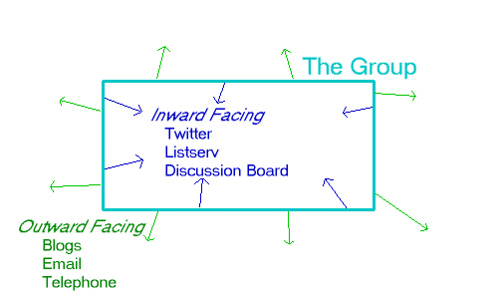Chairs in boats by Stuck in Customs http://flickr.com/photos/stuckincustoms/216810101/
I work in the Institute of Educational Technology at the OU, where we've recently had a review. The result is something of a reorganisation. There are good and bad elements to it, as always. I'm not going to go into the review itself, but rather reorganisations in general. Reorgs were a feature of the early PC industry, partly I think to demonstrate that these type of companies were more fluid and dynamic than the highly structured, rigid companies that had come before them, e.g. Apple vs IBM.
Reorgs weren't always productive though. In his book, 'Insanely Great' about the development of the Mac, Steven Levy argues that the constant reorgs at Apple were one of the reasons Apple struggled to follow up on the initial success of the Mac (this was back in the 80s). One could take a 'Social Life of Information' perspective and argue that through reorgs a lot of that informal, socially bound knowledge that is required for organisations to function is lost, or at least disrupted.
So, at one extreme excessive reorganisation destroys some of social fabric that holds an organisation together. But I wonder if in higher education we are too much at the opposite end. I remember a colleague arguing that far from have too many reorgs, we don't have enough. This allows people to think that the way things are structured now is the only way it can be. Artificial divides build up between disciplines, people tend to work with the same crowd, and there is sedimentation around process and ideas. I accept that there are a host of other issues that surround reorgs, for instance job security, identity, the time and cost involved and one's sense of professionalism, but if these are satisfied, then I think there may be something in what my colleague was saying.
So maybe a reorg every 5 years or so should be standard, and we could have faculties such as 'Social Sciences and Mechanical Engineering', 'Computing and History' and 'Sports Science and Mathematics'.
Actually, I think that with new ways of connecting, it's not that the reorg should be more prevalent, but rather that organisational structures, which are often physical organisational structures, are increasingly irrelevant. My OU network is as much to do with my OU Twitter network as it is to do with my 'formal' placement in a group, which is in an Institute. I think it is addressing how we nurture, manage and support these kinds of structures that will be the next challenge rather than finding ways of slicing the cake differently.
Or put another way, in Weinberger's term reorgs are about filtering on the way in, we need to find ways of filtering on the way out.



